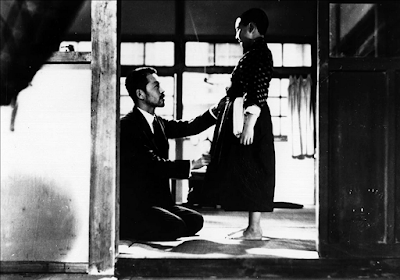After a career spanning 53 films over 35 years, Yasujiro Uzo died in 1963 from throat cancer. His final film was released the previous year, SANMA NO AJI.
Ozu again focusses on a middle-class family as Japan embraces modernity.
Widower Hirayama lives with daughter Michiko and younger son Kazuo. His older son Koichi is married to nagging Akiko who wants all the latest gadgets.
Hirayama is nagged by old friends Kawai and Horie to get Michiko married - although she doesn't want to - and Hirayama reflects on this after meeting the sad daughter of his school professor who is stuck looking after him.
Koichi's friend - who Machiko quietly likes - admits he has a girlfriend, so Kawai suggests a man he knows.
Michiko relents and marries. but after the wedding Hirayama is alone: dressed in his best suit someone asks did he attend a funeral and he replies "Something like that".
Shelf or charity shop? A shelf on it's own. A perfect distillation of Ozu's themes and pure, spare storytelling. While preparing the script with regular co-writer Kogo Noda, Ozu's beloved mother died which cast a pall over the process and there is a sadness lurking in the corners of the film which comes into it's own at the end when Hirayama returns home to the house he now only shares with his youngest son who obviously will soon leave too. Ozu's film pops with Ozu regular Yuharu Atsuta's Fujicolour cinematography and the score by Ozu's collaborator Kojun Saito. As always Ozu drew great performances from some favourite actors: Ryuji Kita and Nobuo Nakamura are delightful as Harayama's interfering friends, Kyoko Kishida is eye-catching as a friendly bar owner, while Haruko Sugimura, in her 9th Ozu film, has only one scene but is sensational as the old teacher's sad daughter. Keiji Sada and Mariko Okada are good as Hirayama's bickering son and daughter-in-law while Shima Iwashita has a rare gravity as Machiko. But above all, Ozu's favourite actor Chishu Ryu is wonderful as Hirayama, beautifully underplayed and heartbreaking in his sozzled loneliness. Although the film seems like the perfect 'last film', Ozu was working on a new project when he sadly died on his 60th birthday. He was buried with his mother, the gravestone bears no name just the Japanese character for 'nothingness'.
Arigato Ozu-san, arigato.


.png)
.png)
.png)
.png)



.png)
.png)
.png)



.png)

.png)


.png)

































